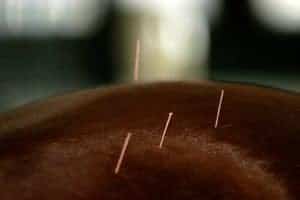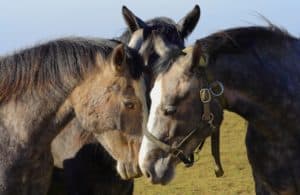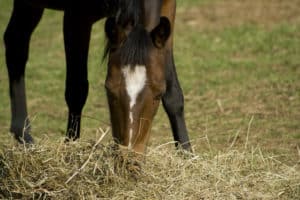
Complementary Therapies for Horses
Learn about reasons to use complementary therapies such as acupuncture and chiropractic for your horse and the research behind them.

Learn about reasons to use complementary therapies such as acupuncture and chiropractic for your horse and the research behind them.

Orphan foals raised with a correct balance of nutrients and monitored for growth, food consumption, and weight gain can be every bit as tall, strong, and athletic as foals raised by their dams.

Making clean water available to your horse might seem like an easy task, but it’s not always as simple as it sounds. Here’s what to consider about your horse’s water sources.

A barn’s first-aid kit, with all the essentials in one place, is a great idea for any horse owner.

Horses rely far more on chemical messages in the air than on their relatively indistinct eyesight.
Develop your senior horse’s diet with geriatric conditions and challenges in mind.

The latest therapies for injured tendons and ligaments focus on rebuilding tissue to its original strength.

Is there a better way to feed hay to horses? There are dozens of hay feeder options, as it turns out, each with its own advantages. Hay feeders are designed to keep hay off the ground and sheltered from the elements to reduce wastage.
They represent only a tiny portion of your horse’s feed intake, but they pack a nutritional wallop several times their size. Break down the components of the equine diet and think, for a moment, about what each accomplishes for your ho
When was the last time you stepped into a feed room that didn’t contain a wide array of buckets, bottles, and tubs of supplements? Supplements have become more the rule than the exception.
Finding it difficult to schedule enough

Here’s how to roll with Mother Nature through the seasons, nutritionally speaking.
A medication protocol that can induce lactation in “open” mares has changed the way prominent Kentucky Standardbred nursery, Walnut Hall Ltd., manages its nurse mare herd, while giving more than 20 rescued mares a new
Walnut Hall’s vet, Joe
Agricultural journalist Mary-Louise Zanoni has succeeded in keeping the USDA from applying Privacy Act safeguards to information it has collected from livestock owners as part of the
Stay on top of the most recent Horse Health news with
© 2022 Copyright Statement dolor sit amet, consetetur sadipscing User Terms, sed diam nonumy eirmod tempor invidunt ut labore et dolore magna aliquyam erat, sed diam voluptua. At vero eos et accusam et justo duo dolores et ea rebum. Stet clita kasd gubergren, no sea takimata sanctus est Lorem ipsum dolor sit amet.